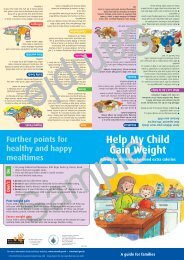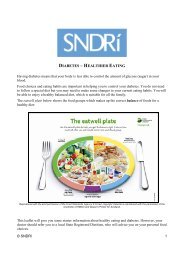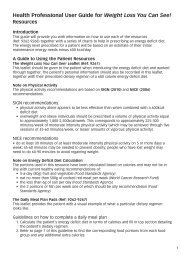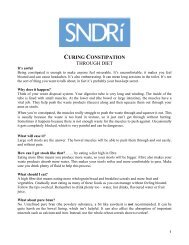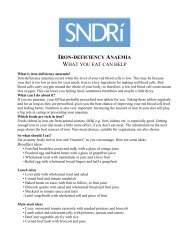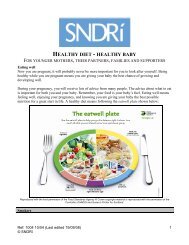Cardio-protective Diet for You - NDR-UK
Cardio-protective Diet for You - NDR-UK
Cardio-protective Diet for You - NDR-UK
You also want an ePaper? Increase the reach of your titles
YUMPU automatically turns print PDFs into web optimized ePapers that Google loves.
Guidelines <strong>for</strong> blood fat levels<br />
Most centres have their own guidelines <strong>for</strong> target cholesterol levels. Ask your doctor, nurse or<br />
dietitian what these are and compare them to your own levels in the table below.<br />
<strong>You</strong>r measurements<br />
Measurement Local guidelines <strong>You</strong>r results<br />
Total Cholesterol<br />
LDL<br />
HDL<br />
Ratio TC: HDL<br />
Triglycerides<br />
<strong>Cardio</strong>vascular risk assessment<br />
<strong>You</strong>r consultant, specialist nurse or dietitian is likely to give you an annual ‘<strong>Cardio</strong>vascular risk<br />
assessment’. They will consider in<strong>for</strong>mation including your age, gender, family history, lifestyle<br />
and blood fat levels to calculate your risk of developing cardiovascular disease within the next ten<br />
years.<br />
Ask your healthcare team <strong>for</strong> more in<strong>for</strong>mation if you are interested in knowing more.<br />
Medication <strong>for</strong> cholesterol and triglycerides<br />
If your cholesterol remains high after you have made diet and lifestyle changes, your doctor and<br />
dietitian may suggest you take medication to help lower your cholesterol. Usually a statin will be<br />
prescribed, but fibrates or ezetimibe may be used. If your GP decides to start you on statin<br />
medication, it is important to ask your HIV consultant or pharmacist if this is suitable as some<br />
statins may interact with your anti-retroviral therapy. <strong>You</strong>r doctor may also consider switching<br />
your ARV if it is known to raise cholesterol levels.<br />
Improving your diet can reduce your cholesterol levels and lower risks of developing heart<br />
disease<br />
A better diet could improve your cholesterol levels and help decrease your risks of developing<br />
heart disease. Even small changes in your cholesterol are likely to help improve your long-term<br />
health.<br />
Fat<br />
Not all fats are equal. The effect of different types of fat on your cholesterol levels are described<br />
below.<br />
To lower your cholesterol levels, it is important to try and reduce the overall amount of fat in your<br />
diet – healthy fats should also only be used in small amounts.<br />
• Saturated Fat<br />
A reduction in total saturated fat intake can reduce your cholesterol levels. Generally<br />
saturated fat is found in products which come from animals. Foods very high in saturated<br />
fat include fatty cuts of red meat, the skin from poultry, full-fat dairy products like full-fat<br />
milk or ice cream, animal-based cooking fats like butter, ghee, lard, dripping and products<br />
120404Heart Health <strong>for</strong> HIV DRAFT<br />
2



